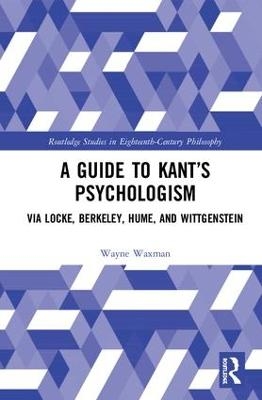
A Guide to Kant’s Psychologism
via Locke, Berkeley, Hume, and Wittgenstein
Seiten
2019
Routledge (Verlag)
978-0-367-14111-0 (ISBN)
Routledge (Verlag)
978-0-367-14111-0 (ISBN)
This book presents an interpretation of Kant’s Critique of Pure Reason as a priori psychologism. The book reconciles Kant’s philosophy with subsequent developments in science and mathematics, including post-Fregean mathematical logic, non-Euclidean geometry, and both relativity and quantum theory.
This book presents an interpretation of Kant’s Critique of Pure Reason as a priori psychologism. It groups Kant’s philosophy together with those of the British empiricists—Locke, Berkeley, and Hume—in a single line of psychologistic succession and offers a clear explanation of how Kant’s psychologism differs from psychology and idealism. The book reconciles Kant’s philosophy with subsequent developments in science and mathematics, including post-Fregean mathematical logic, non-Euclidean geometry, and both relativity and quantum theory. It also relates Kant’s psychologism to Wittgenstein’s later conception of language. Finally, the author reveals the ways in which Kant’s philosophy dovetails with contemporary scientific theorizing about the natural phenomenon of consciousness and its place in nature. This book will be of interest to Kant scholars and historians of philosophy working on the British empiricists.
This book presents an interpretation of Kant’s Critique of Pure Reason as a priori psychologism. It groups Kant’s philosophy together with those of the British empiricists—Locke, Berkeley, and Hume—in a single line of psychologistic succession and offers a clear explanation of how Kant’s psychologism differs from psychology and idealism. The book reconciles Kant’s philosophy with subsequent developments in science and mathematics, including post-Fregean mathematical logic, non-Euclidean geometry, and both relativity and quantum theory. It also relates Kant’s psychologism to Wittgenstein’s later conception of language. Finally, the author reveals the ways in which Kant’s philosophy dovetails with contemporary scientific theorizing about the natural phenomenon of consciousness and its place in nature. This book will be of interest to Kant scholars and historians of philosophy working on the British empiricists.
Wayne Waxman is the author of Kant’s Anatomy of the Intelligent Mind, Kant and the Empiricists, Hume’s Theory of Consciousness, and Kant’s Model of the Mind. He is retired and lives in New Zealand.
Introduction
Chapter 1: Breaking the Mold
Part I: The Path to Kant: Psychologism and Conventionalism
Chapter 2: Locke’s Oyster
Chapter 3: Berekely’s Vision
Chapter 4: Hume’s Cement
Chapter 5: From Hume to Kant via Wittgenstein
Part II: Nature in Mind: Through Kant’s I’s
Chapter 6: The Kantian Cogito
Chapter 7: The Logical I
Chapter 8: The Aesthetic I
Chapter 9: The Objective I
Chapter 10: The I of Nature
Conclusion
| Erscheinungsdatum | 18.03.2019 |
|---|---|
| Reihe/Serie | Routledge Studies in Eighteenth-Century Philosophy |
| Verlagsort | London |
| Sprache | englisch |
| Maße | 152 x 229 mm |
| Gewicht | 589 g |
| Themenwelt | Geisteswissenschaften ► Philosophie ► Logik |
| Geisteswissenschaften ► Philosophie ► Philosophie der Neuzeit | |
| Naturwissenschaften | |
| ISBN-10 | 0-367-14111-6 / 0367141116 |
| ISBN-13 | 978-0-367-14111-0 / 9780367141110 |
| Zustand | Neuware |
| Informationen gemäß Produktsicherheitsverordnung (GPSR) | |
| Haben Sie eine Frage zum Produkt? |
Mehr entdecken
aus dem Bereich
aus dem Bereich
ein Gegenentwurf zum kurzfristigen Denken : so werden wir zu den …
Buch | Hardcover (2023)
REDLINE (Verlag)
CHF 27,90
Buch | Softcover (2023)
De Gruyter (Verlag)
CHF 34,90


